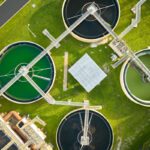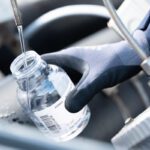Firms join forces to deliver circular water solutions for UK industry
Global engineering and built environment consultancy Arup and Dutch industrial water specialist Evides Industriewater have signed a Memorandum of Understanding (MOU) designed to address...
Comment: Why predictive intelligence is non-negotiable for UK water
By Ryan Pearson of water technology firm Metasphere.
The Independent Water Commission’s (IWC) Final Report, delivered in July 2025, is being called the water sector's...
Water stewardship needs “same level of urgency” as climate and biodiversity, says ISEP report
Water deserves the same level of focus globally as climate change and biodiversity loss, according to a new paper from the Institute of Sustainability...
Water Discovery Challenge returns to bring more fresh thinking innovators into the water sector
The Water Innovation Fund is opening its doors to innovators from outside the water sector to enter bold solutions to the urgent challenges facing...
Whose pollution is it anyway? Project will use bacteriophages to point the finger
An ambitious interdisciplinary project is aiming to develop and test a first-of-its-kind tool which can trace the sources of pollution in UK water bodies....
Cleaning up PFAS with PFAS will backfire, warn scientists
A new paper in Nature Communications raises a red flag about fluorinated sorbents, a class of emerging materials for removing PFAS from water. The...
Rainwater-only irrigation system launches at premiership club, with accompanying awareness campaign
In what seems an important advance, and a relatively rare one with UK sports infrastructure, Manchester City has announced that its City Football Academy,...
New predictive tech tackles oxygenation of fisheries
A new technology solution to tackle problems like algal blooms combines data science, environmental science, AI and IoT to monitor and predict water-quality issues,...
Technology firm signs asset monitoring deal with Southern Water
Southern Water has partnered with specialist technology company Samotics to deploy its SAM4 smart condition monitoring system at sites across southern England. The artificial...
£25 million Water Efficiency Lab competition aims to drive innovation and cut water use...
Ofwat announced its inaugural Water Efficiency Lab (‘WEL 1’) on 25 November. The £25 million challenge-led competition is intended to unlock and scale innovations...
Strategic guide to water innovation launched by Spring
A valuable resource that will help innovators navigate, access and engage with the UK and Ireland water sector’s innovation ecosystem has launched.
Developed by...
Northumbrian Water appoints installation partner for smart metering programme
Northumbrian Water has appointed United Infrastructure as its installation partner for a major smart meter transformation programme across the North East of England.
Under a...
Report details staggering extent of water leaks problem, and how real-time monitoring can help
European properties are losing millions of euros annually due to water leakages, according to the latest Annual Water Report from Smartvatten, a firm that...
Consultation launched on mandatory water-saving features for new homes
Simple water-saving measures could save families in new homes over £100 a year on bills, while supporting a wave of new housing across Britain,...
Missoula Water advances leak detection after rigorous competition
An acoustic pipe monitoring leak detection technology that uses fire hydrants to host multi-sensor devices, has already found more than a dozen leaks for...
Industry must prepare for tighter restrictions on water use, says industrial process water specialist
This article contains paid for content produced in collaboration with Evides UK.
The UK’s new National Framework for Water Resources 2025 lays the groundwork for...
How synthetic turf is supplying fresh water in South Africa
A project in South Africa is using a form of synthetic turf to enable freshwater recycling, in what seems a novel attempt to solve...
Ultrasound system can remove BPA from water more effectively
Researchers have found a new way to remove a common pollutant from water using controlled waves of ultrasound, without the use of additional chemicals.
The...
AI tool improves access to critical water research
In a period of unprecedented change and scrutiny for the UK water sector, UK Water Industry Research (UKWIR) have announced a significant advancement in...
Puraffinity and US Army Corps of Engineers partner to advance PFAS remediation technologies
This article contains paid for content produced in collaboration with Puraffinity.
Puraffinity, a leading innovator of advanced adsorbents for the removal of per- and polyfluorinated...





















